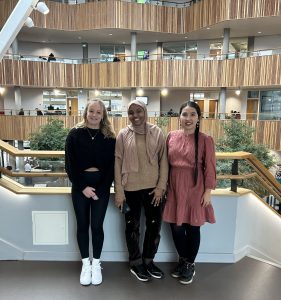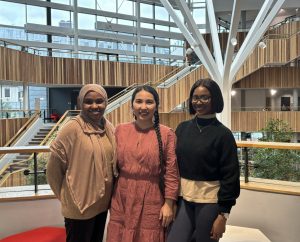OpenBright grants have been available since 2020 to support women in the development of research projects at the university level, focusing on subjects related to computing and technology. OpenBright offers small grants for students studying for degrees or postgraduate qualifications in areas such as software engineering, data science, digital media, artificial intelligence, and robotics.

We are thrilled to introduce the awardees:

Assemgul Kozhabek (Final year Ph.D. candidate): Assemgul is the second-time OpenBright grant awardee. Her plan is to upgrade her computer system to conduct a thorough analysis of road networks. This upgrade will greatly support her project, titled “Examining the Topology of Urban Road Networks in densely populated countries: China and India”. Assemgul and her supervisor Dr. Wei Koong Chai abstracted road networks as complex systems and employ tools from network science to study their properties. This study introduces multi-level urban road network robustness metrics, which incorporates macro, meso and micro perspectives. Assemgul thanks her supervisor Dr. Wei Koong Chai and Dr. Melanie Coles for their guidance and support!
Fatima Ahmad Muazu (1st year Ph.D. student): Fatima got funding for her project “The Use of Mobile Learning and Assistive Technologies for Enhancing Digital Inclusion in Special Education for Learners with Learning Disabilities in underserved regions of Northern and Southern Nigeria”. The funding will be used to conduct a preliminary needs analysis involving stakeholders and students in special education settings of 4 Nigerian secondary schools.
Ayo Agbeja (MSc Data Science and Artificial Intelligence): Ayo’s research title is “Plastic Wastes and Sustainability Targets in Germany: A Policy Simulation Experiment using Machine Learning”. Her project has a primary focus on Germany and aims to investigate the relationship between policies related to plastic waste management and sustainability objectives, particularly in the context of reducing carbon emissions. This simulated model will take into account the key factors: economic growth, oil and coal production, the generation of renewable energy, and energy consumption, while making projections based on an optimal weighting of these factors.

 BU PhD student receives OpenBright grant
BU PhD student receives OpenBright grant Broadening horizons: Network Science at Utrecht Summer School
Broadening horizons: Network Science at Utrecht Summer School










 Fourth INRC Symposium: From Clinical Applications to Neuro-Inspired Computation
Fourth INRC Symposium: From Clinical Applications to Neuro-Inspired Computation Writing policy briefs
Writing policy briefs Upholding Excellence: The Concordat to Support Research Integrity
Upholding Excellence: The Concordat to Support Research Integrity Today’s Documentation Will Serve Tomorrow’s Justice
Today’s Documentation Will Serve Tomorrow’s Justice ECR Funding Open Call: Research Culture & Community Grant – Application Deadline Friday 12 December
ECR Funding Open Call: Research Culture & Community Grant – Application Deadline Friday 12 December MSCA Postdoctoral Fellowships 2025 Call
MSCA Postdoctoral Fellowships 2025 Call ERC Advanced Grant 2025 Webinar
ERC Advanced Grant 2025 Webinar Horizon Europe Work Programme 2025 Published
Horizon Europe Work Programme 2025 Published Horizon Europe 2025 Work Programme pre-Published
Horizon Europe 2025 Work Programme pre-Published Update on UKRO services
Update on UKRO services European research project exploring use of ‘virtual twins’ to better manage metabolic associated fatty liver disease
European research project exploring use of ‘virtual twins’ to better manage metabolic associated fatty liver disease